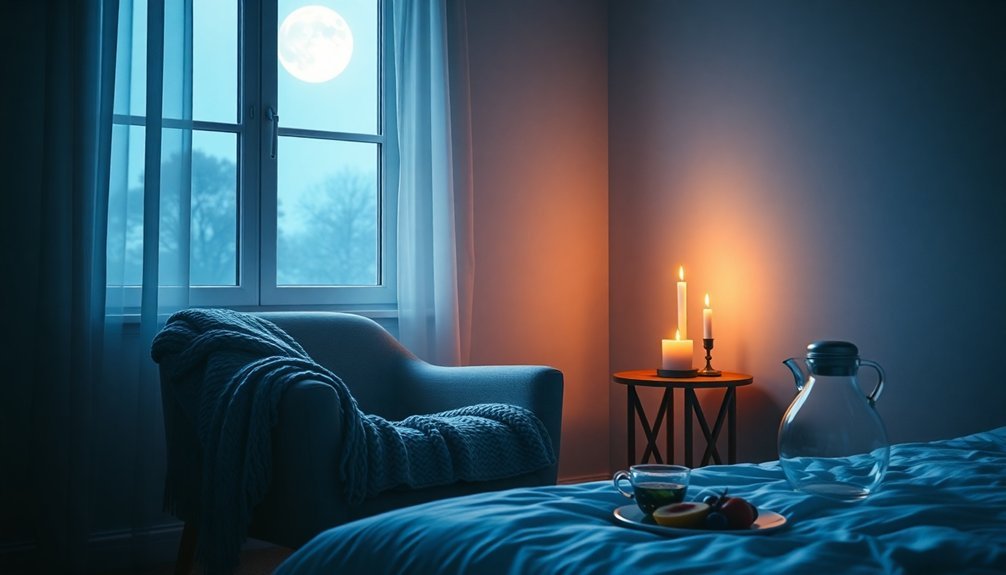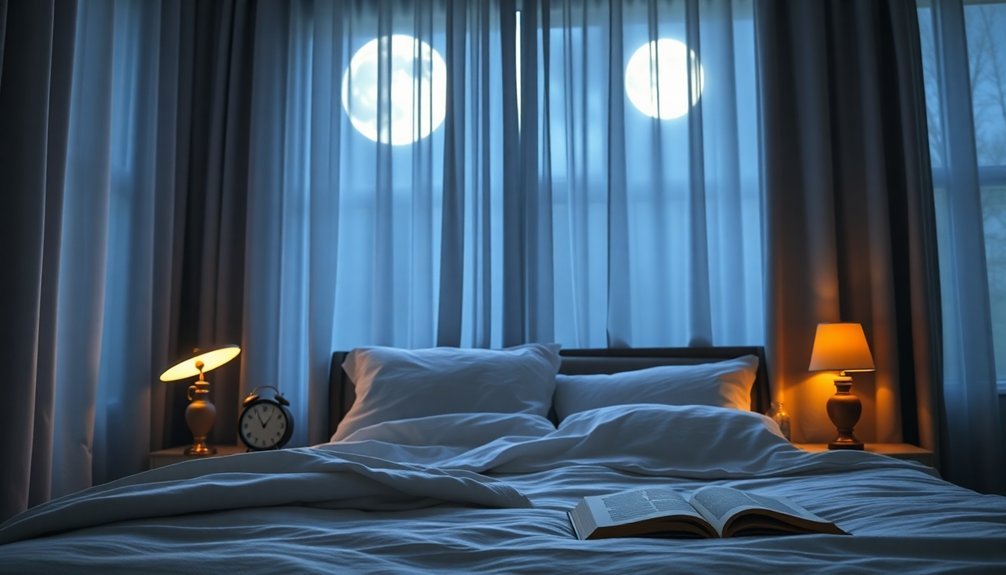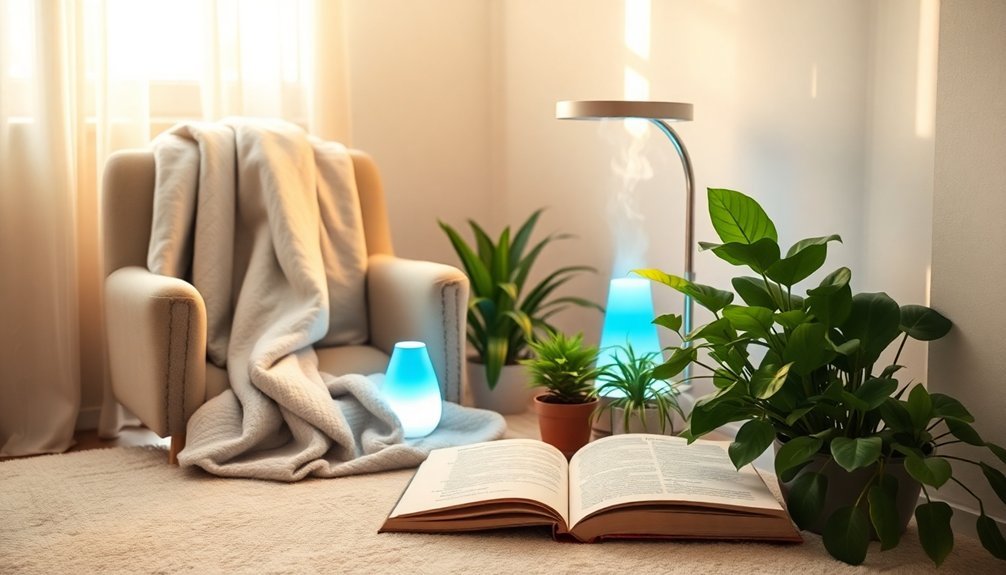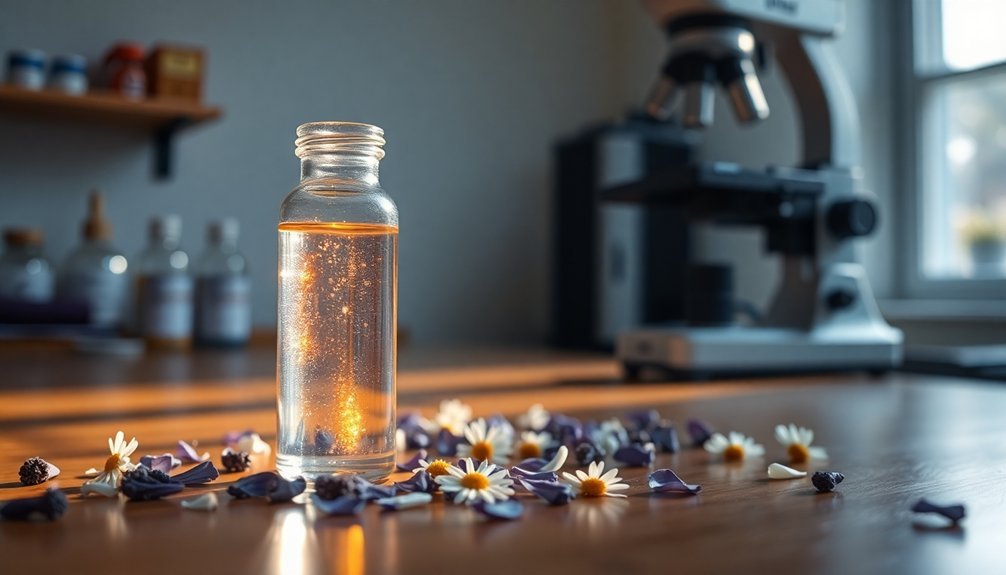To boost your melatonin production, you should focus on three essential nighttime protocols. First, avoid blue light exposure by using blue-light-blocking glasses or apps on your devices an hour before bed. Next, establish a consistent sleep routine by going to bed and waking up at the same time daily, creating a dim environment to signal sleep. Finally, embrace relaxation techniques like gentle yoga or a warm bath to reduce stress and foster sleep readiness. These steps not only enhance melatonin levels but also improve your overall sleep quality, paving the way for deeper insights into optimizing your nighttime habits.
Avoiding Blue Light Exposure

Avoiding blue light exposure is essential for maintaining healthy melatonin production and ensuring a restful night's sleep. Blue light, particularly from electronic devices like phones and tablets, suppresses melatonin, disrupting your circadian rhythm. The short-wavelength light in the 446-477 nm range is most effective at hindering melatonin levels, so even dim blue light can have a noticeable effect. Prolonged exposure to blue light can further exacerbate sleep issues and lead to poorer sleep quality.
Modern lighting, including LEDs and fluorescent bulbs, contributes considerably to your blue light exposure, especially in the evening when it's most detrimental. It tricks your brain into thinking it's still daytime, which interferes with your ability to fall and stay asleep.
To combat this, consider investing in blue-light-blocking glasses, especially those that filter just the blue light while letting other colors through. You can also install blue-light-filtering apps on your devices and dim or turn off lights a few hours before bedtime.
Establishing a Sleep Routine
Establishing a consistent sleep routine is essential for optimizing melatonin production and enhancing your overall sleep quality. Aim to go to bed and wake up at the same time every day, including weekends. This consistency trains your body to anticipate sleep and wake times, stabilizing your circadian rhythm and boosting melatonin levels. Additionally, try to create your routine in a way that acknowledges how melatonin synthesis is influenced by light exposure since irregular schedules can disrupt melatonin secretion, affecting your overall sleep-wake cycle.
Create a dim light environment at least an hour before bedtime. Reducing light exposure signals your pineal gland to increase melatonin production. Avoid bright lights and electronic devices during this period to prevent sleep onset delays.
Also, maintain a cool sleep environment, ideally around 67°F (18.5°C). A cooler room promotes better sleep quality and aligns with peak melatonin levels.
Limit your time in bed to the hours you're actually sleeping. If you find yourself awake for extended periods, get up and engage in a calming activity until you feel sleepy again.
This helps associate your bed with sleep, reinforcing your sleep routine and optimizing melatonin regulation throughout the night.
Embracing Relaxation Techniques

While it's easy to overlook relaxation in the hustle of daily life, embracing techniques like breathing exercises and gentle yoga can greatly enhance your nighttime routine. Incorporating these practices not only reduces stress but also promotes melatonin production, helping you achieve a deeper sleep. Engaging in relaxation techniques can help manage seasonal depression by aligning with the body's natural circadian rhythm.
Here's a quick overview of effective relaxation techniques:
| Technique | Benefits | How to Practice |
|---|---|---|
| Breathing Exercises | Lowers stress and cortisol | Breathe in for 4 counts, hold, then exhale for 4. Repeat this for a few minutes. |
| Progressive Relaxation | Releases tension in muscles | Tense each muscle group for a few seconds, starting from your feet to your head. |
| Yoga Nidra | Promotes relaxation and mindfulness | Lie comfortably and follow guided meditation focused on relaxation. |
| Gentle Pre-Sleep Activities | Eases into relaxation mode | Engage in low-light reading or stretching, avoiding screens an hour before bed. |
| Warm bath | Reduces cortisol, boosting melatonin | Take a warm shower or bath to prepare your body for sleep. |
Frequently Asked Questions
How Does Diet Affect Melatonin Production?
Your diet greatly influences melatonin production. Consuming foods high in tryptophan, vitamin B6, and magnesium can enhance levels. Incorporate melatonin-rich foods like pistachios and tart cherries for better sleep and maximize your overall health.
What Role Does Exercise Play in Sleep Quality?
Exercise considerably boosts your sleep quality by reducing stress hormones and enhancing deep sleep. Aim for moderate activity earlier in the day to support your body's natural rhythms and optimize your overall restfulness.
Can Supplements Enhance Melatonin Levels Effectively?
Supplements can enhance melatonin levels effectively, but individual responses vary. You might find them helpful for specific sleep issues. Remember to consult with a healthcare professional before starting to guarantee they're right for you.
What Environmental Factors Impact Melatonin Secretion?
Environmental factors like light exposure, both intensity and timing, greatly impact your melatonin secretion. Dim light at night or insufficient daylight can affect your sleep patterns, disrupting your natural circadian rhythm and melatonin production.
How Does Stress Influence Melatonin Production?
Stress influences melatonin production by increasing cortisol, which inhibits synthesis. When you're stressed, your body's ability to regulate melatonin gets disrupted, leading to irregular sleep patterns and potential long-term effects on your circadian rhythms.
In Summary
By avoiding blue light, sticking to a consistent sleep routine, and embracing relaxation techniques, you're setting yourself up for success in boosting your melatonin production. These simple yet effective protocols can help you fall asleep faster and enjoy deeper, more restorative sleep. Remember, it's all about creating an ideal environment for your body's natural processes. So, take these steps tonight, and you'll likely wake up feeling refreshed and energized! Sleep well!





Leave a Reply